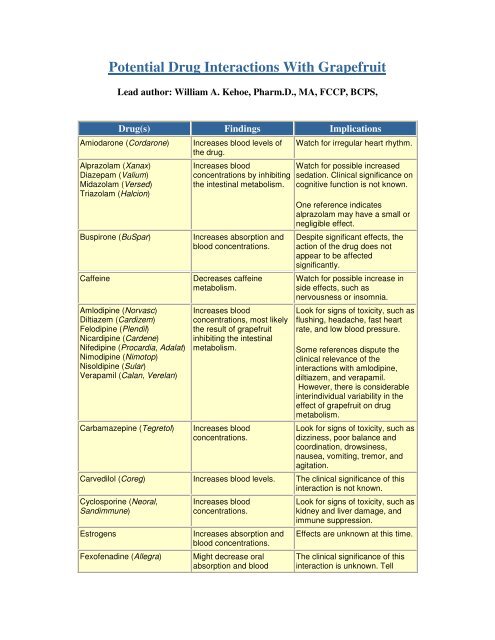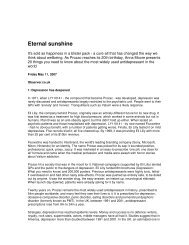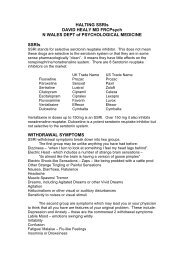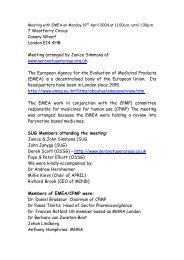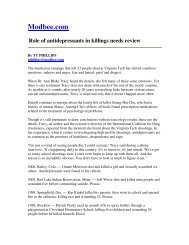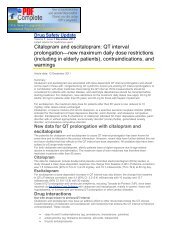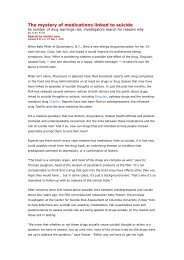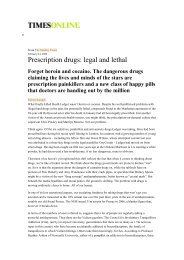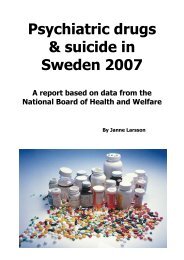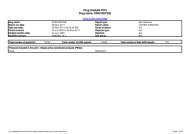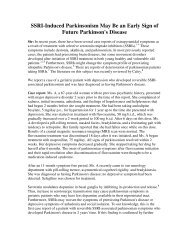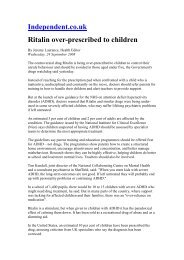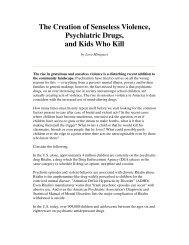Potential Drug Interactions With Grapefruit - Seroxat User Group
Potential Drug Interactions With Grapefruit - Seroxat User Group
Potential Drug Interactions With Grapefruit - Seroxat User Group
You also want an ePaper? Increase the reach of your titles
YUMPU automatically turns print PDFs into web optimized ePapers that Google loves.
<strong>Potential</strong> <strong>Drug</strong> <strong>Interactions</strong> <strong>With</strong> <strong>Grapefruit</strong><br />
Lead author: William A. Kehoe, Pharm.D., MA, FCCP, BCPS,<br />
<strong>Drug</strong>(s) Findings Implications<br />
Amiodarone (Cordarone) Increases blood levels of<br />
the drug.<br />
Alprazolam (Xanax)<br />
Diazepam (Valium)<br />
Midazolam (Versed)<br />
Triazolam (Halcion)<br />
Increases blood<br />
concentrations by inhibiting<br />
the intestinal metabolism.<br />
Buspirone (BuSpar) Increases absorption and<br />
blood concentrations.<br />
Caffeine Decreases caffeine<br />
metabolism.<br />
Amlodipine (Norvasc)<br />
Diltiazem (Cardizem)<br />
Felodipine (Plendil)<br />
Nicardipine (Cardene)<br />
Nifedipine (Procardia, Adalat)<br />
Nimodipine (Nimotop)<br />
Nisoldipine (Sular)<br />
Verapamil (Calan, Verelan)<br />
Increases blood<br />
concentrations, most likely<br />
the result of grapefruit<br />
inhibiting the intestinal<br />
metabolism.<br />
Carbamazepine (Tegretol) Increases blood<br />
concentrations.<br />
Watch for irregular heart rhythm.<br />
Watch for possible increased<br />
sedation. Clinical significance on<br />
cognitive function is not known.<br />
One reference indicates<br />
alprazolam may have a small or<br />
negligible effect.<br />
Despite significant effects, the<br />
action of the drug does not<br />
appear to be affected<br />
significantly.<br />
Watch for possible increase in<br />
side effects, such as<br />
nervousness or insomnia.<br />
Look for signs of toxicity, such as<br />
flushing, headache, fast heart<br />
rate, and low blood pressure.<br />
Some references dispute the<br />
clinical relevance of the<br />
interactions with amlodipine,<br />
diltiazem, and verapamil.<br />
However, there is considerable<br />
interindividual variability in the<br />
effect of grapefruit on drug<br />
metabolism.<br />
Look for signs of toxicity, such as<br />
dizziness, poor balance and<br />
coordination, drowsiness,<br />
nausea, vomiting, tremor, and<br />
agitation.<br />
Carvedilol (Coreg) Increases blood levels. The clinical significance of this<br />
interaction is not known.<br />
Cyclosporine (Neoral,<br />
Sandimmune)<br />
Increases blood<br />
concentrations.<br />
Estrogens Increases absorption and<br />
blood concentrations.<br />
Fexofenadine (Allegra) Might decrease oral<br />
absorption and blood<br />
Look for signs of toxicity, such as<br />
kidney and liver damage, and<br />
immune suppression.<br />
Effects are unknown at this time.<br />
The clinical significance of this<br />
interaction is unknown. Tell
Atorvastatin (Lipitor)<br />
Lovastatin (Mevacor)<br />
Simvastatin (Zocor)<br />
levels. patients it’s best to take<br />
fexofenadine with a plain glass of<br />
water.<br />
Increases absorption and<br />
blood concentrations.<br />
<strong>Grapefruit</strong> interaction<br />
unlikely with pravastatin<br />
(Pravachol) or fluvastatin<br />
(Lescol).<br />
Look for increased toxicity, such<br />
as headache, GI complaints, and<br />
muscle pain.<br />
Itraconazole (Sporanox) Impairs absorption. The clinical significance of this<br />
interaction is not known.<br />
Theoretically it could decrease<br />
efficacy of itraconazole.<br />
Losartan (Cozaar) Might reduce the blood<br />
levels of the drug.<br />
Methylprednisolone<br />
(cortisone)<br />
Increases plasma<br />
concentration ofl<br />
methylprednisolone.<br />
Quinidine Decreases drug<br />
elimination.<br />
Sertraline (Zoloft) Increases serum<br />
concentrations.<br />
Background<br />
Might reduce the effectiveness of<br />
losartan, but further studies are<br />
needed to determine<br />
significance.<br />
Consumption of large amounts of<br />
grapefruit might increase the risk<br />
of adverse effects.<br />
The clinical significance of this<br />
interaction is unknown.<br />
The clinical significance of this<br />
interaction is unknown.<br />
<strong>Grapefruit</strong> juice has been shown to affect the metabolism of several drugs. Included<br />
in the list of potential target drugs are diazepam, cisapride, cyclosporine, felodipine<br />
and other dihydropyridine calcium channel blockers, midazolam, nisoldipine,<br />
triazolam, saquinavir, lovastatin, and atorvastatin. The mechanism of this<br />
interaction appears to primarily result from inhibition of enzymes in the intestinal<br />
wall.<br />
Several constituents of grapefruit juice have been implicated including the<br />
flavonoids naringin and naringenin, along with the furanocoumarins, bergapten and<br />
6,7-dihydroxybergamottin. Unfortunately, the content of these varies between<br />
different grapefruit juices and varieties of fruit, making it impossible to determine if<br />
one is safer than another.<br />
How Long Does the Inhibition Last?<br />
In studies of healthy volunteers, the effect of grapefruit juice appears to last for at<br />
least three days following ingestion, and could perhaps be longer in some patients.<br />
For drugs that are significantly impacted by this interaction, one glass (8 ounces) of<br />
grapefruit juice is enough to cause the interaction, and following regular ingestion,<br />
the effect can last for up to three days following the last glass. Since most patients
take medications on a somewhat regular basis, it appears that the safest approach is<br />
to avoid grapefruit juice altogether.<br />
Since these studies were done in healthy volunteers, patients who are taking these<br />
drug for diseases may have much greater and risky effects. It would be very<br />
difficult to say that these changes would not be important for real patients waiting<br />
to take their medication later in the day after ingesting juice. The only way to avoid<br />
these interaction is to advise patients to not ingest grapefruit juice. Other<br />
alternatives, such as orange juice, may be more appropriate.<br />
In addition to grapefruit juice, many researchers are warning that the fruit itself<br />
could also cause problems. Several studies now indicate that the fruit should also be<br />
avoided in patients taking interacting drugs. Health Canada is now advising<br />
consumers NOT to drink grapefruit juice or eat grapefruit in any form if they are<br />
taking medications that might interact, until they have talked to their doctor or<br />
pharmacist about the potential for side effects.<br />
While sweet oranges and their juice do not appear to cause the same reaction, sour<br />
orange juice such as that from Seville oranges, may have an effect similar to<br />
grapefruit juice. Preliminary research suggests lime juice might also have this<br />
effect. Tangelos are a hybrid of grapefruit and may also interfere with drugs. Most<br />
other citrus fruits, such as lemons, citrons, naturally sweet oranges and tangerines<br />
are considered safe.


